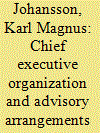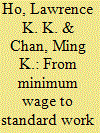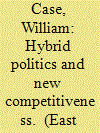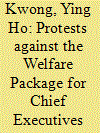| Srl | Item |
| 1 |
ID:
083437


|
|
|
|
|
| Publication |
2008.
|
| Summary/Abstract |
As prime ministers are drawn into international relations and the foreign policy process, they are in need of advisory structures for foreign affairs in their offices. This article examines the system and the role of foreign affairs advisers to the Prime Minister (PM), the chief executive, in Sweden. The article centres on the organization for foreign affairs, in general terms of institutional and staffing arrangements, and on leader-adviser relationships. As the right hand of the PM, inner circle advisers in foreign affairs have a direct role in overseeing foreign policy on the key issues and do more than just serve in an advisory capacity by being operative in diplomacy and in policy coordination. These advisers can therefore wield influence on policy and the government based on their own expertise and position at the centre of power and at the frontier between the chief executive and the outside world
|
|
|
|
|
|
|
|
|
|
|
|
|
|
|
|
| 2 |
ID:
124246


|
|
|
|
|
| Publication |
2013.
|
| Summary/Abstract |
This paper aims to highlight the significance of labour issues - namely, the minimum wage (MW) and standard working hours (SWH) - in shaping candidates' electoral platforms in the 2012 chief executive (CE) election of the Hong Kong Special Administrative Region (HKSAR) under the sovereignty of the People's Republic of China (PRC). We first offer a brief review of labour politics regarding the MW case as a precursor to the SWH drafting and enactment process. We then provide an analytical delineation of some of the labour and socio-economic dimensions of the CE electoral contest by comparing the candidates' campaign planks in relation to SWH. We then attempt to predict the likely course of the SWH debate under the leadership of Leung Chun-ying, who eventually won the CE election and assumed power on 1 July 2012. We conclude by examining Leung's social engineering attempts to increase popular support amongst low- and middle-income (LMI) households as part of his long-term strategy for the 2017 CE elections and his broader Beijing-entrusted political agenda.
|
|
|
|
|
|
|
|
|
|
|
|
|
|
|
|
| 3 |
ID:
085752


|
|
|
|
|
| Publication |
2008.
|
| Summary/Abstract |
In recounting Hong Kong's chief executive election in 2007, this paper charts the unexpected appearance of an "unauthorized" candidate and the occurrence of vibrant campaigning. Further, as electoral competitiveness increased, the liberal form of authoritarian rule that has characterized politics in the Hong Kong Special Administrative Region (HKSAR) began to change in ways that parallel the electoral authoritarianism practiced in Singapore. This paper argues that such change, if regularized and enhanced, may bring greater stability to the HKSAR's politics, yielding greater legitimacy, popular compliance, and hence, new efficiencies in control. Even so, analysis of the chief executive election shows that this competitiveness was strongly resisted by the central government in Beijing.
|
|
|
|
|
|
|
|
|
|
|
|
|
|
|
|
| 4 |
ID:
136295


|
|
|
|
|
| Summary/Abstract |
In recent years, a series of social protests such as the “Sunflower Student Movement”inTaiwan and the “Umbrella Movement”in Hong Kong have sparked concerns over the political atmosphere in the Greater China Region.Compared withTaiwan and Hong Kong,the people of Macao have long been considered politically apathetic,with a low level of political awareness and efficacy. When asked whether they would oppose the government if their interests had been seriously infringed, around 40% of respondents chose to remain silent, perhaps out of a desire for“social harmony,”whereas 92.1% had no experience of engagement in any social movement. (1) It therefore came as a surprise when 20,000 people took to the streets on 25 May 2014 to protest against a bill that would have given generous benefits packages to outgoing Chief Executives (CEs) and top officials. In what was regarded as the biggest march since the 1999 handover, this exceptional scenario reveals the existence of a civic culture among the youth of Macao.
|
|
|
|
|
|
|
|
|
|
|
|
|
|
|
|